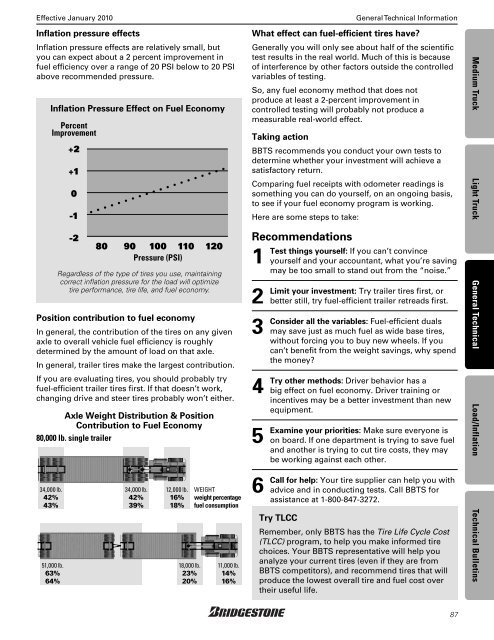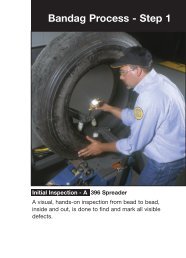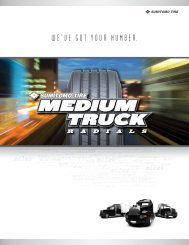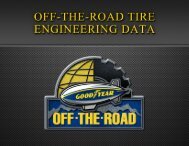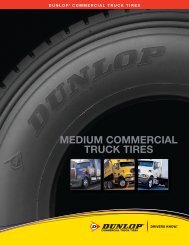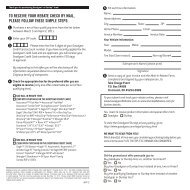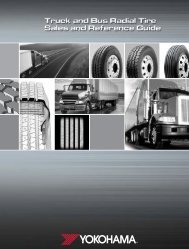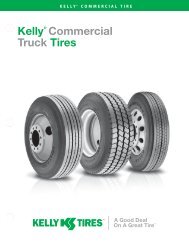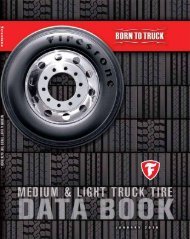Bridgestone Medium and Light Truck Tire Data Book - Sullivan Tire ...
Bridgestone Medium and Light Truck Tire Data Book - Sullivan Tire ...
Bridgestone Medium and Light Truck Tire Data Book - Sullivan Tire ...
You also want an ePaper? Increase the reach of your titles
YUMPU automatically turns print PDFs into web optimized ePapers that Google loves.
Effective January 2010<br />
Inflation pressure effects<br />
Inflation pressure effects are relatively small, but<br />
you can expect about a 2 percent improvement in<br />
fuel efficiency over a range of 20 PSI below to 20 PSI<br />
above recommended pressure.<br />
Inflation Pressure Effect on Fuel Economy<br />
Percent<br />
Improvement<br />
+2<br />
+1<br />
0<br />
-1<br />
-2<br />
80 90 100 110 120<br />
Pressure (PSI)<br />
Regardless of the type of tires you use, maintaining<br />
correct inflation pressure for the load will optimize<br />
tire performance, tire life, <strong>and</strong> fuel economy.<br />
Position contribution to fuel economy<br />
In general, the contribution of the tires on any given<br />
axle to overall vehicle fuel efficiency is roughly<br />
determined by the amount of load on that axle.<br />
In general, trailer tires make the largest contribution.<br />
If you are evaluating tires, you should probably try<br />
fuel-efficient trailer tires first. If that doesn’t work,<br />
changing drive <strong>and</strong> steer tires probably won’t either.<br />
Axle Weight Distribution & Position<br />
Contribution to Fuel Economy<br />
80,000 lb. single trailer<br />
34,000 lb.<br />
42%<br />
43%<br />
51,000 lb.<br />
63%<br />
64%<br />
34,000 lb.<br />
42%<br />
39%<br />
12,000 lb.<br />
16%<br />
18%<br />
18,000 lb.<br />
23%<br />
20%<br />
WEIGHT<br />
weight percentage<br />
fuel consumption<br />
11,000 lb.<br />
14%<br />
16%<br />
General Technical Information<br />
What effect can fuel-efficient tires have<br />
Generally you will only see about half of the scientific<br />
test results in the real world. Much of this is because<br />
of interference by other factors outside the controlled<br />
variables of testing.<br />
So, any fuel economy method that does not<br />
produce at least a 2-percent improvement in<br />
controlled testing will probably not produce a<br />
measurable real-world effect.<br />
Taking action<br />
BBTS recommends you conduct your own tests to<br />
determine whether your investment will achieve a<br />
satisfactory return.<br />
Comparing fuel receipts with odometer readings is<br />
something you can do yourself, on an ongoing basis,<br />
to see if your fuel economy program is working.<br />
Here are some steps to take:<br />
Recommendations<br />
1<br />
Test<br />
2<br />
Limit<br />
3<br />
Consider<br />
4<br />
Try<br />
5<br />
Examine<br />
6<br />
Call<br />
things yourself: If you can’t convince<br />
yourself <strong>and</strong> your accountant, what you’re saving<br />
may be too small to st<strong>and</strong> out from the “noise.”<br />
your investment: Try trailer tires first, or<br />
better still, try fuel-efficient trailer retreads first.<br />
all the variables: Fuel-efficient duals<br />
may save just as much fuel as wide base tires,<br />
without forcing you to buy new wheels. If you<br />
can’t benefit from the weight savings, why spend<br />
the money<br />
other methods: Driver behavior has a<br />
big effect on fuel economy. Driver training or<br />
incentives may be a better investment than new<br />
equipment.<br />
your priorities: Make sure everyone is<br />
on board. If one department is trying to save fuel<br />
<strong>and</strong> another is trying to cut tire costs, they may<br />
be working against each other.<br />
for help: Your tire supplier can help you with<br />
advice <strong>and</strong> in conducting tests. Call BBTS for<br />
assistance at 1-800-847-3272.<br />
Try TLCC<br />
Remember, only BBTS has the <strong>Tire</strong> Life Cycle Cost<br />
(TLCC) program, to help you make informed tire<br />
choices. Your BBTS representative will help you<br />
analyze your current tires (even if they are from<br />
BBTS competitors), <strong>and</strong> recommend tires that will<br />
produce the lowest overall tire <strong>and</strong> fuel cost over<br />
their useful life.<br />
<strong>Medium</strong> <strong>Truck</strong> <strong>Light</strong> <strong>Truck</strong> General Technical Load/Inflation Technical Bulletins<br />
87


